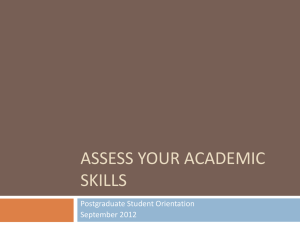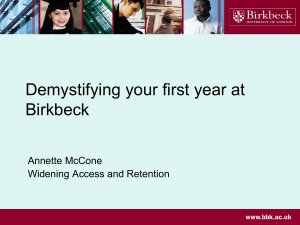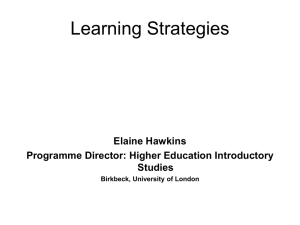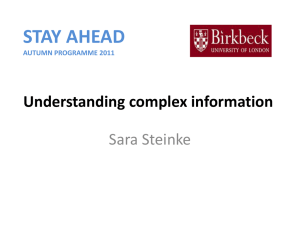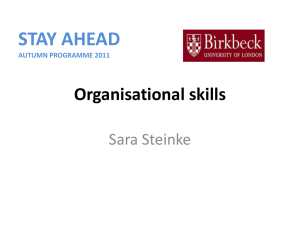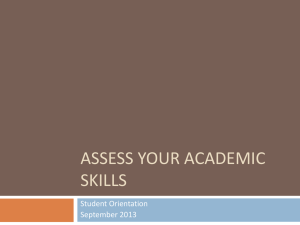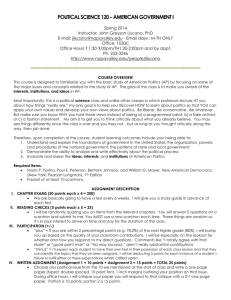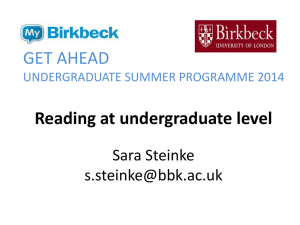Postgraduate Programme Handbook
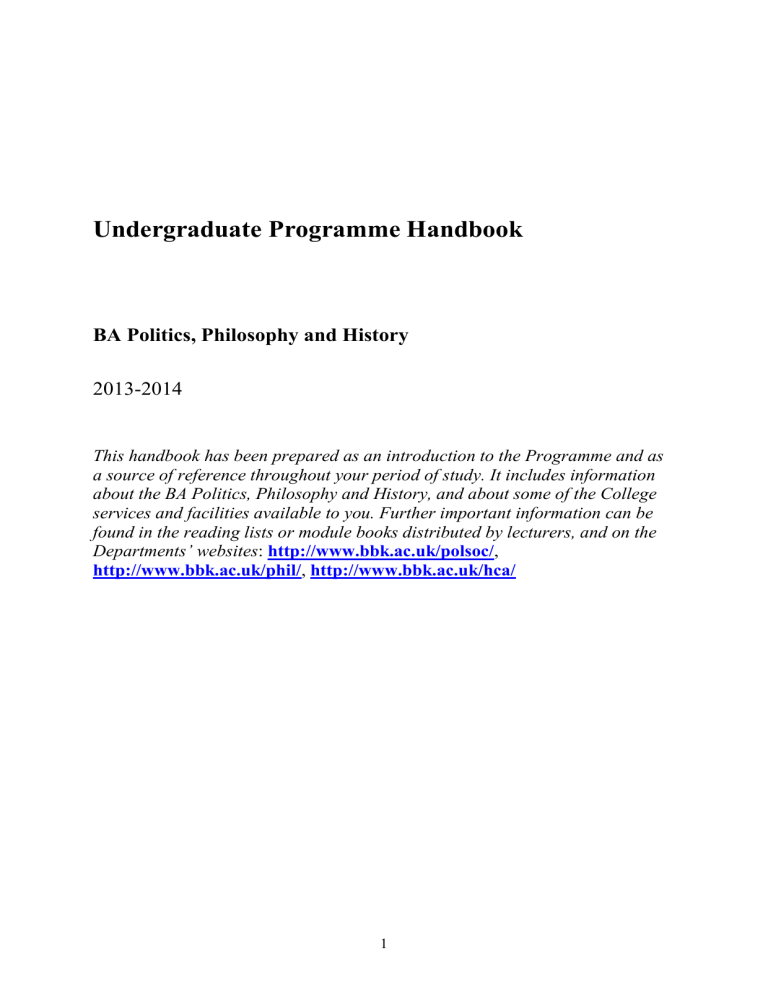
Undergraduate Programme Handbook
BA Politics, Philosophy and History
2013-2014
This handbook has been prepared as an introduction to the Programme and as a source of reference throughout your period of study. It includes information about the BA Politics, Philosophy and History, and about some of the College services and facilities available to you. Further important information can be found in the reading lists or module books distributed by lecturers, and on the
Departments’ websites
:
http://www.bbk.ac.uk/polsoc/
,
http://www.bbk.ac.uk/phil/
,
http://www.bbk.ac.uk/hca/
1
Contents
The BA Politics, Philosophy and History
Introduction
Structure of the degree
Programme administration
Members of staff and contact details
Teaching arrangements
Dissertations
Break in studies policy and withdrawal form a module or programme
Results
Repeating modules and intermediate awards
Further information on studying at Birkbeck
Location
Access
The Centre for the Study of British Politics and Public Life
Location
Access
Departmental websites
Departmental blog and twitter
Keeping in touch
Student Support and Disability Advice
Student Support
Study Support
English language support for non-native speakers
Disability Statement
The Disability Office
Access at Birkbeck
The Disabled Students Allowance
The Personal Assistance Scheme
Support in your School
Specific Learning Difficulties (Dyslexia)
Examinations
Further information
Annex
Criteria for the Award of Honours
Disclaimer and useful links
2
The BA Politics, Philosophy and History
Introduction
The BA Politics, Philosophy & History (PPH) was founded in 1988 and has established itself as one of the College’s most innovative and successful degrees. It draws on the combined strengths of three of the College’s strongest Departments, the Departments of Politics,
Philosophy, and History, Classics & Archaeology. Over the years, each of these Departments has acquired a reputation for teaching and research of which it is justly proud. These strengths are reflected in the consistently outstanding ratings all three Departments have received in external assessments of both teaching quality and research excellence. In collaborating on the PPH degree, they offer a BA programme that is genuinely interdisciplinary: the course structure is designed not merely to require students to study a certain amount of each of the three subjects but to draw the three disciplines together and use them to interrogate one another.
The primary teaching commitment of all three Departments remains the provision of topquality undergraduate and postgraduate education to part-time students in full-time employment. Teaching and learning arrangements on both the PPH compulsory courses and the option courses offered by the individual departments have been designed accordingly to meet the needs of such students. The BA PPH attracts a body of students whose diverse professional experience, personal backgrounds, and maturity, mean that they bring to the classroom tremendous breadth and depth of knowledge, often in fields relevant to the subjects under study. This enriches the intellectual life of the College for students and faculty alike.
Structure of the Degree
The BA Politics, Philosophy & History is an honours degree bringing together three popular and interesting subjects in a unique combination. The degree is a genuine interdisciplinary programme into which a great deal of planning and prior thought has been put by a strong team of staff from the three departments. The degree is unified by the three modules taught by members of all three contributing departments and taken by all the students on the degree:
Rise of the Modern State, Conceptions of the Human from the Enlightenment to the Present, and Problems of Explanation and Interpretation. These modules bring the three disciplines together and focus on problems they share in common.
The BA Politics, Philosophy and History provides a broad understanding of modern politics, philosophy and history, and of the relationships between the forms of knowledge they represent. It takes an innovative, interdisciplinary approach, bringing together the three disciplines. It will prepare you to undertake a higher degree or to move into a career in education, the arts, politics or journalism.
You will develop and practice skills of communication, presenting, analysing and evaluating social science evidence and arguments, and academic writing. If you choose to write a dissertation, you will develop the ability to conduct independent research.
All students must complete twelve modules to complete the degree: i. six compulsory modules;
3
ii. six option modules; students may, in lieu of their sixth option module, choose to submit a dissertation.
PART-TIME (FOUR YEARS) FULL-TIME (THREE YEARS)
YEAR ONE
1. Introduction to the Study of Politics
2. Introduction to the History of Philosophy
3. EITHER Rise of the Modern State OR Conceptions of the Human
YEAR TWO
4. Historiography
5. EITHER Rise of the Modern State OR Conceptions of the Human
6. Level 5 or Level 6 option
YEAR THREE
7. EITHER Problems of Explanation and
Interpretation OR one level 6 option
8. One level 5 or one level 6 option
9. One level 5 or one level 6 option
YEAR ONE
1. Introduction to the Study of Politics
2. Introduction to the History of Philosophy
3. EITHER Rise of the Modern State OR Conceptions of the Human
4. Level 5 option
YEAR TWO
5. Historiography
6. EITHER Rise of the Modern State OR Conceptions of the Human
7. EITHER Problems of Explanation and
Interpretation OR Level 5 or Level 6 option
8. Level 5 or Level 6 option
YEAR THREE
9. EITHER Problems of Explanation and
Interpretation OR one level 6 option
10. One level 10 option
11. One level 6 option
12. EITHER Dissertation OR one level 6 option
YEAR FOUR
10. EITHER Problems of Explanation and
Interpretation OR one level 6 option
11. One level 6 option
12. EITHER Dissertation OR one level 6 option
Compulsory modules
The three compulsory modules run in alternate years. Rise of the Modern State and
Conceptions of the Human are taken in year 1 or year 2. Problems of Explanation and
Interpretation is taken in year 3 or 4 by part-time students and in year 2 or 3 by full-time students.
Rise of the Modern State examines the social, political, cultural and intellectual changes which gave rise to modern political systems in Europe.
Conceptions of the Human from the Enlightenment to the Present examines the idea of the human as a kind of being distinct from all others, enabling students to gain detailed understanding of key developments in the idea of the human in philosophical and social scientific discourse from the eighteenth century on. The course explores the transformations to which our understanding of it has been subjected by the social sciences, and maps the part it plays in modern thought, systems of governance, and accounts of good and evil.
Problems of Explanation and Interpretation analyses the approaches of the three disciplines to the distinct logic of social explanation, problems of meaning and interpretation, and historiography and historical interpretation.
In addition to these cross-disciplinary modules, you will take The Study of Politics,
Introduction to the History of Philosophy and Historiography. These modules are taken in the
4
first and second years and provide students with an introduction to the key analytical skills required in the study of Politics, Philosophy and History.
Indicative list of options
Politics
Contemporary British Politics
Introduction to International Political Economy
Democracy and Authoritarianism
War & Modern Society
Social and Political Theory
The Politics of European Integration
Food, Politics, and Society
Capitalism and the Politics of Markets
Parliamentary Studies
Russian Politics and Society, 1905-Present
American Politics and Foreign Policy
British and Comparative Foreign Policy
Politics and the Middle East
Challenges in Contemporary Politics
International Migration and Transnationalism
For up to date details on Politics options, please see: http://www.bbk.ac.uk/politics/currentstudents/undergraduates
Philosophy
(NB: some philosophy modules are 15 credits; if you choose a 15 credit module in one term you MUST choose a second 15 credit module in the other term)
Ethics and Politics
History of Philosophy
Epistemology and Metaphysics
Agency and Accountability
Ethics
Foundations of Analytic Philosophy
Further Epistemology and Metaphysics
Further History of Philosophy
Mind and Body
5
Nietzsche
Philosophical Logic
Philosophy of Language
Philosophy of Science
Political Philosophy
For up to date details on Philosophy, please see: http://www.bbk.ac.uk/philosophy/currentstudents/ba-philosophy/ba-philosophy
History
America from 1600
British History 1500-1750
Modern History of East Asia
Europe from 1800
Noble Society in Early Modern Europe
Colonial Encounters: Race, Identity, and Cultural Exchange in the British Empire
The Ottoman Empire
Crime, Poverty and Popular Protest in England
The Russian Revolution
Ireland and the Irish from the Act of Union to Partition
Empire in Comparative Perspective
The Reconstruction of Europe 1945-50
Contested Nation: Germany 1871-1918
History of Paris
The Age of the Plague
The Third Reich
The State and Sexuality in Twentieth Century Britain
Literature, Culture and Society in Interwar Britain
For up to date details on History choices, please see: http://www.bbk.ac.uk/history/currentstudents/undergraduateresources/ba-timetables/ba-timetable-13
Students are required to make their option module choices by the end of August. For full details about how to complete the BA options form…etc, please see: http://www.bbk.ac.uk/politics/current-students/undergraduates/ba-option-choices
6
Programme administration
PPH is an interdisciplinary degree, so although it has no one department of its own it is close to the interests of all three departments. The Chair of the degree is Samantha Ashenden
(Politics). It has an administrator who is based in the Department Office of the Department of
Politics. An Admissions Tutor interviews new entrants to the degree. Decisions about PPH are taken by the PPH Committee which is made up of all staff who teach on the degree.
In addition to course tutors and the PPH Chair, each department contributing to the degree has a designated PPH tutor. The role of the PPH tutors is to act as a point of contact with the departments, to be available to discuss problems with study, the organisation of workloads, and problems affecting study. You will be allocated a tutor at the beginning of your degree and are encouraged to approach the tutors with any concerns you may have about the programme.
If you have any problems with a particular course, please feel free to talk to the lecturer involved, or consult one of the PPH tutors or the Chair of the degree.
Members of Staff and Contact Details
Permanent Teaching Staff
Dr Samantha Ashenden, Department of Politics (Chair of PPH and PPH Tutor)
Email: s.ashenden@bbk.ac.uk
, Tel: 020 7631 6781
Dr Cristian Constantinescu, Department of Philosophy (PPH Tutor)
Email: c.constantinescu@bbk.ac.uk
Dr Sarah Howard, Department of History Classics and Archaeology (PPH Tutor)
Email: s.howard@bbk.ac.uk
Professor Kenneth Gemes, Department of Philosophy
Email: k.gemes@bbk.ac.uk
Dr Robert Northcott, Department of Philosophy
Email: r.northcott@bbk.ac.uk
Professor Daniel Pick, Department of History, Classics and Archaeology
Email: d.pick@bbk.ac.uk
Dr Jan Rüger, Department of History, Classics and Archaeology
Email: j.rueger@bbk.ac.uk
Class Tutor
Linda Blandford (Rise of the Modern State and Conceptions of the Human)
Email: linda.blandford@btinternet.com
7
PPH Administrator
Irene Breckon
Department of Politics
Email: i.breckon@bbk.ac.uk
Tel: 020 7631 6780
For a full list of staff of the Departments, see the Departments’ websites
Teaching Arrangements
All lectures and classes are held between 6.00pm and 9.00pm in the evening. Each level five and level six 30-credit module on the programme amounts to between thirty and forty hours of teaching (lectures and seminars). These modules meet one night a week during both autumn and spring term although some other modules on the degree have a slightly different structure. The degree involves attendance, on average, on two or three evenings a week for
20 weeks per year. Students are examined at the end of the year in the units they have completed that year.
Dissertations
In the final year of study, and with the agreement of the PPH Chair and course team, students may choose to submit a dissertation in lieu of one option module. The dissertation, which must be between 8,000 and 10,000 words in length, offers an opportunity to research a subject in depth, and to prepare a substantial, argued piece of work.
Students who wish to do a dissertation rather than an option module must indicate so on their BA options form, which must be submitted by 31 August. http://www.bbk.ac.uk/politics/current-students/undergraduates/ba-option-choices
Once students have chosen to do a dissertation, they must submit a completed dissertation proposal form by 31 October. The purpose of this form is to identify a research topic for your dissertation on the basis of which you will be allocated a Dissertation Supervisor by the PPH
Chair.
If you propose to do research involving interviews or other forms of personal participation, your dissertation proposal must be accompanied by a completed ethics proposal form to ensure that your dissertation meets Birkbeck’s rules on research ethics. Dissertation proposal forms and full guidelines on writing an undergraduate dissertation are available from the
Department of Politics website: http://www.bbk.ac.uk/politics/current-students/undergraduates
Break in Studies Policy and Withdrawal from a Module or Programme
Withdrawing from a module
Students who wish to withdraw from the examination for a module should inform the PPH
Chair in advance of the examination. Students who do so without claiming mitigating circumstances that are then accepted by the PPH Exam Board will fail the module and be given two additional
attempts to pass the module via re-take or reassessment (see section on repeating modules below). Students who withdraw from a module and claim mitigating circumstances that are approved by the PPH Exam Board will be offered either alternative assessment (see section
8
of repeating modules below) or three additional chances to pass the module at the discretion of the PPH Exam Board. Please note that where a first-year, part-time student withdraws from a module, it falls to the PPH Exam Board to decide whether this module must first be passed before the student can proceed to the second year of study. For further details on mitigating circumstances, please see: http://www.bbk.ac.uk/mybirkbeck/services/administration/assessment/exams/mitigatingcircumstances
Withdrawing from your dissertation
Students who wish to withdraw from their dissertation must inform the PPH Chair before the dissertation is due. Students who do so without claiming mitigating circumstances that are then accepted by the PPH Chair will be given two additional attempts to pass. Students who claim mitigating circumstances that are approved by the PPH Chair will be offered three remaining chances to pass the dissertation. The revised date for submitting the dissertation will be determined by the PPH Chair.
For further details on mitigating circumstances, please see: http://www.bbk.ac.uk/mybirkbeck/services/administration/assessment/exams/mitigatingcircumstances
Break in Studies
College regulations permit a student to suspend studies for a maximum of two years in total during their programme of study. Please see the PPH Chair and the Department Office if you are considering a break in studies. Further details on relevant College regulations can be found here: http://www.bbk.ac.uk/mybirkbeck/services/rules/bis.doc/view
Withdrawing from your programme
If for any reason you decide to withdraw from your degree on a permanent basis, we hope you will talk to us first. Students choose to withdraw for a wide range of reasons and it may be that we will be able to make arrangements to help you complete your course.
For further information, please see: http://www.bbk.ac.uk/mybirkbeck/services/administration/withdrawing
Please note that if you are requesting a refund, a medical certificate is required, where applicable. Please note that the reimbursement policy is as follows:
A student who withdraws 15 or more days after the start of the first term of study, or after they have completed enrolment (whichever is the later) is liable for payment of tuition fees for the first term of their intended study, and all subsequent terms up to and including the term in which they withdraw. Liability for tuition fees is divided equally across all terms of study (with the exception explained in 20 below), e.g. for study over three terms tuition fee liability is:
Term 12: 1/3 of total course fee
9
Term 2: 2/3 of total course fee
Term 3: All of total course fee
For full details, please see: http://www.bbk.ac.uk/mybirkbeck/services/rules/Terms%20and%20Conditions%202013-
14.pdf
Results
When you submit coursework during the year you can usually expect to receive a mark and feedback within three weeks. All marks are provisional until they are approved by the PPH
Exam Board, which meets in July of each year. Exam and dissertation results are released after the July meeting of the PPH Exam Board. These results will be made available to you via your My Birkbeck Profile ( http://www.bbk.ac.uk/mybirkbeck/ ) but please note that it can take up to several weeks after the Exam Board meets until marks for all students are entered on this system.
Repeating modules and intermediate awards
If you fail a module you will be offered two additional attempts to pass the module. This second attempt will take the form of a ‘re-take’, ‘re-assessment’ or ‘alternative assessment’ at the discretion of the Politics Exam Board. A re-take requires attendance at the module’s lectures and seminars as well as another attempt at the assessment, whereas “re-assessment” is where a student attempts only the failed element(s) of a failed module. Alternative assessment allows a student to submit additional coursework in lieu of a second attempt at an exam and can be offered only in those cases where a student has applied for mitigating circumstances and this claim has been accepted by the PPH Exam Board. For further details on mitigating circumstances, please see: http://www.bbk.ac.uk/mybirkbeck/services/administration/assessment/exams/mitigatingcircumstances
Intermediate awards can be offered by the Examinations Board when a student fails to complete the full requirements for the degree.
Qualification
Certificate in higher education
Credits needed
120
Diploma in higher education 240
(including 120 at level 5 or above)
10
Further information about studying at Birkbeck
Location
The Department of Politics is located at 10 Gower Street, and the Department Office on the ground floor is open for enquiries between 10:00 and 18:00 every weekday. Please press the buzzer for the Department Office for access. Members of staff have offices in 10 Gower
Street or adjacent buildings. Much of the teaching is held in Birkbeck’s main building in
Malet Street.
Access
You will need your Birkbeck ID card throughout your time at Birkbeck, since it acts as your
College ID card, library card and access card. Once you have completed your enrolment, you will be entitled to an ID card. The simplest way to get your ID card is by ordering it via your
My Birkbeck profile. Just upload a recent image of yourself and submit your order.
Alternatively, visit the My Birkbeck Helpdesk where they can take a photo of you and produce a card. Please note you may be required to queue during busy periods. The ID card will remain valid for the duration of your studies, and you will not be issued with a new card for each subsequent academic year. See the following link for further details: http://www.bbk.ac.uk/mybirkbeck/services/you/cards
If you lose or damage your Birkbeck student card, a replacement can be ordered for a nonrefundable fee of £10.00. See the following link for further details: http://www.bbk.ac.uk/mybirkbeck/services/you/cards/replacement
Departmental websites
The departments’ websites ( www.bbk.ac.uk/politics , www.bbk.ac.uk/phil , www.bbk.ac.uk/hca ) carry information about the departments, the staff, students and courses, and notice boards. Also available are learning resources, such as guidelines on essay and dissertation writing, course materials (access to which may require a password and username), and links to sites of particular interest to students in Politics, Philosophy and
History. Students are advised to familiarise themselves with these websites and to visit them regularly.
Departmental blog and twitter
See the Politics departmental blog ( www.10-gower-street.com
) for updates by scholars from
Birkbeck and beyond on political research in progress and commentary on current affairs.
You can also follow the Department on twitter ( https://twitter.com/bbkpolitics ).
Keeping in touch
Please check the Politics Department website ( www.bbk.ac.uk/politics ) regularly for notices.
Email is the main method by which we will contact you, so it is important that we get your email address right. Please check your My Birkbeck profile to ensure that we have the correct email address for you ( http://www.bbk.ac.uk/mybirkbeck ).
Change of address
11
You must inform the Registry if you change address at any time while studying at Birkbeck.
You can do so online by logging into your 'MyBirkbeck Profile'
( http://www.bbk.ac.uk/mybirkbeck/ ).
Student Support and Disability Advice
Student support
As a Birkbeck student, you have access to a range of support facilities including:
Accommodation services
Career services
Counselling service
Financial support
Health services
Nursery
Students' Union
For more details, please see: http://www.bbk.ac.uk/mybirkbeck/services/facilities
Study support
The Centre for Learning and Professional Development (CLPD) offers a range of academic development workshops for students. Some courses are initially only available to first year undergraduates, but other students can join a standby list. All workshops are free of charge unless stated otherwise. Topics covered in these modules include:
Moodle
Reading skills
Note taking
Time Management
Essay writing
Academic English
For more details, please see the Centre for Learning and Professional Development website: http://www.clpd.bbk.ac.uk/students/
English language support for non-native speakers
The Academic English module offered by the Centre for Learning and Professional
Development (see above) is open to native and non-native speakers. For a module aimed specifically at non-native speakers, the College runs a range of short modules designed for students who are about to start a university degree or are already studying at undergraduate or postgraduate level. An additional fee is charged for attending these modules.
For further details, please see: http://www.bbk.ac.uk/study/ce2013/englishlanguagefornonnativeenglishspeakers/index.html
12
Disability Statement
At Birkbeck there are students with a wide range of disabilities including dyslexia, visual or hearing impairments, mobility difficulties, mental health needs, medical conditions, respiratory conditions. Many of them have benefited from the advice and support provided by the College’s Disability Office.
The Disability Office
The College has a Disability Office located in room G12 on the ground floor of the Malet
Street building. We have a Disability Service Manager, Mark Pimm, a Disability
Administrator, John Muya and a Mental Health Advisor, Elizabeth Hughes. We will shortly be appointing an SpLD Advisor.
All enquiries should come to the Disability office, who will determine the appropriate referral to specialist staff. They can provide advice and support on travel and parking, physical access, the Disabled Students Allowance, special equipment, personal support, examination arrangements etc. If you have a disability or dyslexia, we recommend you come to our drop in session where we can discuss support and make follow up appointments as necessary. The drop-in sessions are between 4pm and 6pm Monday to Thursday.
The Disability Office can also complete an Individual Student Support Agreement form with you, confirming your support requirements and send this to your School and relevant
Departments at the College so they are informed of your needs.
Access at Birkbeck
Birkbeck's main buildings have wheelchair access, accessible lifts and toilets, our reception desks have induction loops for people with hearing impairments and we have large print and tactile signage. Disabled parking, lockers, specialist seating in lectures and seminars and portable induction loops can all be arranged by the Disability Office.
The Disabled Students Allowance
UK and most EU students with disabilities on undergraduate and postgraduate courses are eligible to apply for the Disabled Students' Allowance (DSA). The DSA usually provides thousands of pounds worth of support and all the evidence shows that students who receive it are more likely to complete their courses successfully. The Disability Office can provide further information on the DSA and can assist you in applying to Student Finance England for this support.
The Personal Assistance Scheme
Some students need a personal assistant to provide support on their course, for example a note-taker, sign language interpreter, reader, personal assistant, disability mentor or dyslexia support tutor. Birkbeck uses a specialist agency to recruit Personal Assistants and they can assist you with recruiting, training and paying your personal assistant. Please contact the
Disability Office for information on this scheme.
13
Support in your School
The provision which can be made for students with disabilities by Schools is set out in the
Procedures for Students with Disabilities. This is available from the Disability Office and on the disability website (see below).
As mentioned above your School will receive a copy of your Individual Student Support
Agreement from the Disability Office. This will make specific recommendations about the support you should receive from the School.
Whilst we anticipate that this support will be provided by the Programme Director, tutors and
School Administrator in the School of Arts also has a Student Disability Liaison Officer. If you experience any difficulties or require additional support from the School then they may also be able to assist you. They may be contacted through the School Office or the Disability
Office.
Support in IT Services and Library Services
There is a comprehensive range of specialist equipment for students with disabilities in IT
Services. This includes software packages for dyslexic students (e.g. Claroread and
Inspiration), screen reading and character enhancing software for students with visual impairments, specialist scanning software, large monitors, ergonomic mice and keyboards, specialist orthopaedic chairs etc. For advice and assistance please contact Disability IT
Support. There is also a range of specialist equipment in the Library including a CCTV reading machine for visually impaired students as well as specialist orthopaedic chairs and writing slopes. The Disability Office refers all students with disabilities to the Library Access
Support service who provides a comprehensive range of services for students with disabilities.
Specific Learning Difficulties (Dyslexia)
Mature students who experienced problems at school are often unaware that these problems may result from their being dyslexic. Whilst dyslexia cannot be cured, you can learn strategies, which make studying significantly easier. If you think you may be dyslexic you should contact the Disability Office who can screen you and where appropriate refer you to an Educational Psychologist for a dyslexia assessment. These assessments cost £225. Some students can receive assistance in meeting this cost from their employer. In exceptional cases students may receive assistance from the Access to Learning Fund.
Examinations
Students with disabilities and dyslexia may be eligible for special arrangements for examinations e.g. extra time, use of a word processor, amanuensis, enlarged examination papers etc. In order to receive special arrangements a student must provide medical evidence of their disability (or an Educational Psychologists report if you are dyslexic) to the
Disability Office. For School examinations you should contact your Programme Director to request special arrangements at least 2 weeks before the examination. For main College summer examinations you are given the opportunity to declare that you require special provision on your assessment entry form. Students who require provision should then attend an appointment with the Disability Office to discuss and formalise the appropriate arrangements. The closing date for making special examination arrangements in College examinations is the 15th March and beyond this date consideration will only be given to emergency cases.
Further information
14
Full information on disability support can be found at: http://www.bbk.ac.uk/mybirkbeck/services/facilities/disability
For further information or to make an appointment to see the Disability office, please call the
Student Centre on 020 7631 6316 or email disability@bbk.ac.uk
.
Alternatively you can go to the Disability Office in room G12 between 4pm and 6pm
Monday – Thursday for during their drop-in hours.
15
Annex: Criteria for the Award of Honours
1. In order to obtain an Honours Degree in Politics, Philosophy and History, students must accumulate a total of 360 credits. Students must therefore normally pass twelve 30 credit modules, or the equivalent in 15 credit modules, in order to be awarded the degree, except in cases where credit for prior study has been approved.
2. The PPH programme consists of three compulsory modules at level 4, two compulsory modules at level 5, and one compulsory module at level 6. Students take further options to the value of 180 credits, of which at least 90 credits must be at level 6. Options are taken equally from the three disciplines, i.e. 60 credits in Politics, History and Philosophy respectively.
3. Rise of the Modern State, Conceptions of the Human, Problems of Explanation and
Interpretation, The Study of Politics, Introduction to the History of Philosophy, and Historiography are all designated as compulsory modules. Students must attend and take all assessment for these modules. If any of these modules are failed in the first instance, students must retake or be reassessed for the module (up to a total of three failed attempts).
4. A passing grade for a module is recorded when a student achieves an overall module result of
40% or above.
5. If a student achieves an overall module result of between 30-39%, their grade is recorded as a fail. Students may be reassessed for the failed elements of their assessment on the module, up to a total of three failed attempts.
6. A student failing a module while achieving a result of between 30-39% may be offered a
Compensated Fail by the Examination Sub-Board for the BA Politics, Philosophy and History. No more than two 30 credit modules designated as Compensated Fails may contribute towards the 360 credits required to obtain a degree. No more than 30 credits Compensated Fail (i.e. one module) contributing towards the final credit total can be at Level 6.
7. A student achieving a module result of less than 29% will be deemed to have failed the module with an unsatisfactory performance. No credit will be awarded for the module and students cannot be reassessed. Students may only retake the entire module, which requires that they attend all scheduled contact sessions and complete all assessment on the module on the next occasion that it runs.
8. The Examination Sub-Board for the BA Politics, Philosophy and History determines whether a student failing with an overall module result between 30-39% is to be reassessed for the failed elements of assessment, or is required to retake the entire module.
9. When calculating final degree classification, only Level 5 and Level 6 modules contribute. The final classification is a weighted average of Level 5 and Level 6 modules; Level 5 weighted at 1, and Level 6 at 2.
9.1 The College sets the class of Degree that may be awarded as follows:
First: 70% or above for the average weighted module results
Upper Second:
Lower Second:
60% or above for the average weighted module results
50% or above for the average weighted module results
16
Third: 40% or above for the average weighted module results
9.2 Where a student’s average result is within 2% of the next (higher) degree classification the Sub-
Board of Examiners should consider the number of modules and credit for which the assessment falls within a particular class. If a candidate has preponderance of module results in a higher class than that determined by the aggregate result, the higher degree may be awarded.
9.3 A student may obtain a Pass classification if they have accumulated 300 credits, with at least
120 credits at Level 6, and no more than 60 credits as Compensated Fail (of which no more than
30 can be at Level 6).
9.4 A student may NOT attempt further modules above a total of 360 credits in order to improve his/ her average result.
9.5. The Examination Sub-Board for the BA Politics, Philosophy and History may take into account such additional factors as may have affected candidates’ performance and any special difficulties the candidate may have experienced, such as illness. Discretion will be used to the benefit of the candidate and not otherwise.
17
Annex: Disclaimer and Useful links
Regulations, procedures and codes of practice:
Ever effort has been made to ensure that the information provided in this programme handbook is accurate at the time of going to press. For full, up-to-date information about College regulations, please see: http://www.bbk.ac.uk/reg/regs
Other useful links
Department of Politics http://www.bbk.ac.uk/politics
Moodle: http://www.ble.ac.uk
Regulations, procedures and codes of practice: http://www.bbk.ac.uk/reg/regs
Regulations for Taught Programmes of Study: http://www.bbk.ac.uk/mybirkbeck/services/rules/casregs.pdf
Mitigating Circumstances Policy, Procedure and Guidance: http://www.bbk.ac.uk/mybirkbeck/services/rules/mitcircspol.pdf
Break-in-Study Policy: http://www.bbk.ac.uk/mybirkbeck/services/rules/bis.doc
College Policy on Plagiarism and other Assessment Offences http://www.bbk.ac.uk/mybirkbeck/services/rules/assmtoff.pdf
Disability and dyslexia support http://www.bbk.ac.uk/mybirkbeck/services/facilities/disability
Birkbeck data protection policy http://www.bbk.ac.uk/hr/policies_services/policies_az/data_protection_policy
18
